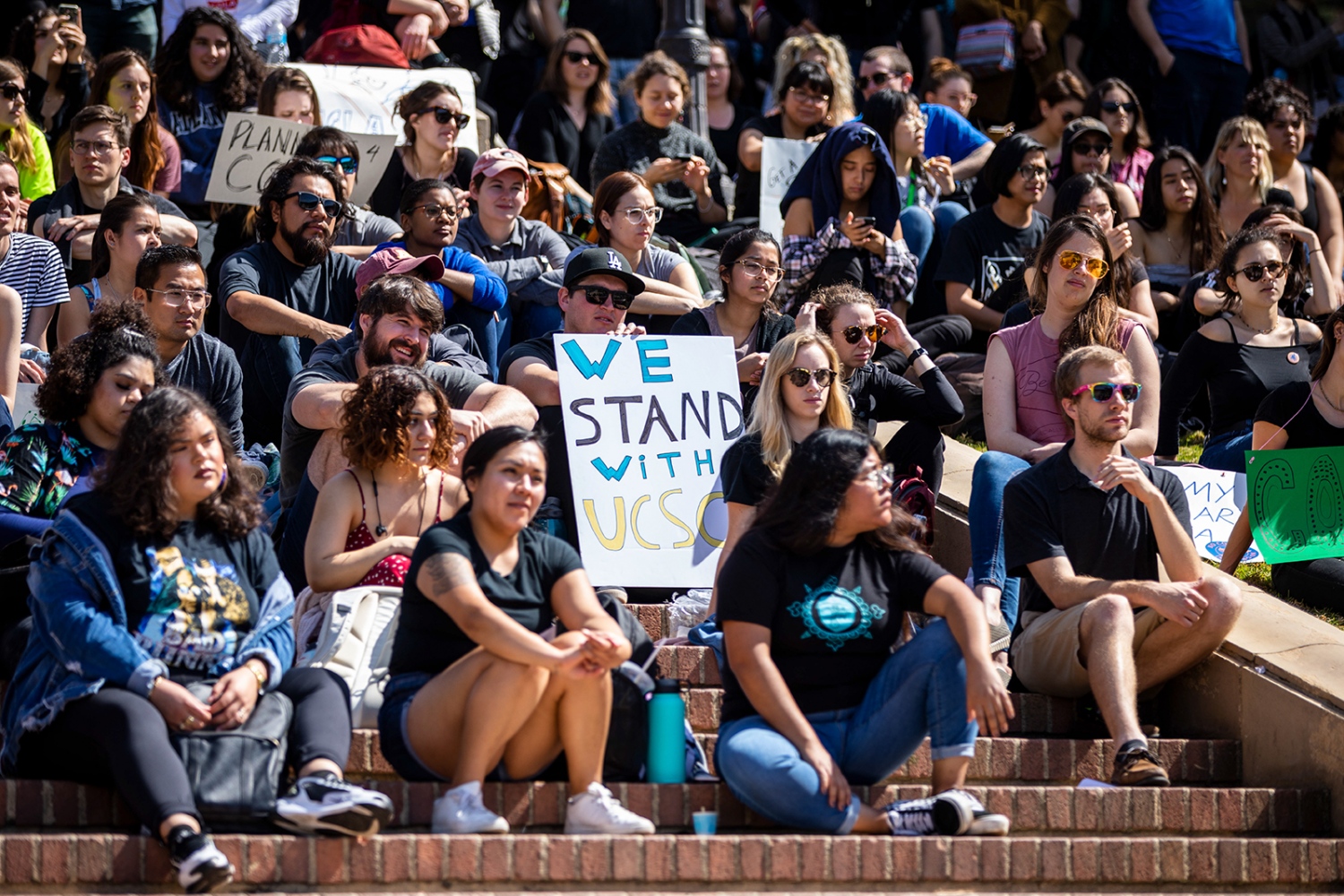Grad students need financial support past summer fellowships to help COLA concerns

Graduate students at UCLA are being supported in the short term with summer fellowships but must continue to receive financial support throughout the COVID-19 pandemic. (Jintak Han/Daily Bruin senior staff)
By Jake Brophy
April 6, 2020 1:25 p.m.
Ask for a mile, UCLA will give an inch – especially when it comes to paying its graduate students a living wage.
The Ucla4Cola movement has been asking for that mile for months. But between abysmal communication, poorly allocated funds and complete avoidance of housing insecurity complaints, UCLA has done little to alleviate the rent burden many graduate students face – something that has become all the more frustrating given the extra hardships imposed by the COVID-19 pandemic.
The university announced a summer fellowship on March 10 that will offer students a need-based stipend of $2,500 a month for three months to support research and other work. The funds for the fellowship were taken in part from the Centennial Campaign, which raised $414 million for graduate student fellowships, as well as other institutional funds.
The announcement came after graduate students voted to go on strike regardless of support from United Auto Workers Local 2865, the union that represents academic student workers, pending support from at least 10 departments. Though the demonstrations were ultimately delayed because of the campus shutdown, the demand for a cost of living adjustment remains potent for many students.
This fellowship may be a step in the right direction, but it’s not a resource that will be available to all graduate students – meaning many will still be left without the funds they need. In addition, the university is failing to communicate with its student body, leaving members of the Graduate Students Association feeling they have been misled or lied to about how Centennial Campaign funds can be spent.
What students need is a housing stipend that can guarantee the funds necessary to live in one of the country’s most expensive neighborhoods. More than that, they need a university that is capable of having straightforward conversations about student needs, which have become even more important amid the preexisting financial insecurities now aggravated by a pandemic.
For many students, not only is the fellowship inadequate – it doesn’t even address the issue.
“I think that (the stipend) sort of avoids the problem,” said Cooper Lynn, a graduate student in the Department of Slavic, East European and Eurasian Languages and Cultures. “It does seem to sort of sidestep what we’re asking for, which is a cost of living adjustment.”
The stipend is simply too limited to be an effective support and consistent security net for graduate students. What they need is a more permanent solution to the financial hardships they face.
And while the summer stipend might help keep them afloat for a few months, it does little in the long run to help students.
Providing basic needs is even more urgent with the campus shut down and an economic downturn caused by the COVID-19 pandemic, which has resulted in an estimated 7.1 million unemployed, according to the US Department of Labor. For those students who have lost secondary jobs or whose family economic situations have suffered, these stipends are a drop in the bucket.
The university claims one of the difficulties in providing graduate students with something like a housing stipend is that the Centennial Campaign, from which the summer fellowship was partially withdrawn, is fairly inflexible.
“The majority of the gifts to the campaign, including the funds raised for student financial support, are designated for specific purposes, and the university cannot redirect that money to other areas or programs,” said UCLA spokesperson Ricardo Vazquez in an emailed statement.
For this same reason, UCLA is forced to look elsewhere for funds to support graduate students who might be facing financial hardships during campus shutdown. Vazquez said the university is working on raising funds from donors, the Spark campaign and the state to help students most affected by the economic impacts of the COVID-19 pandemic.
However, the limited nature of UCLA’s control over the Centennial Campaign’s fund is called into question by the fact that the summer fellowship is funded by the Centennial Campaign at all.
“I had a meeting in January where … (the administration) is telling me they can’t use the Centennial funds for housing subsidies,” said Zak Fisher, president of the GSA. “And now all of a sudden … that’s what’s happened.”
Granted, the fellowship isn’t a housing subsidy in the sense that the Ucla4Cola movement is advocating for, but Fisher said the university told him and the GSA that they couldn’t use funds from the Centennial Campaign to support graduate students.
A month later, they did just that.
Regardless of the actual control UCLA has over the Centennial Campaign’s funds, it’s troubling that students feel deceived by administration, even as the university continuously asserts its commitment to open, honest discussion with its grad students.
To be fair, the Centennial Campaign raised an impressive $414 million in graduate student fellowship support, but this money will go toward things like the summer fellowship UCLA announced in March. What students really need is a long-term stipend that can explicitly support them in areas such as housing.
And even if UCLA is to be believed, the inflexibility of the Centennial Campaign’s fund means that students likely won’t receive much support for hardships faced as a result of COVID-19 – severely reducing the fund’s usefulness.
Passionate leadership and growing support have ensured that Ucla4Cola’s message is far-reaching, even during this difficult time.
Let’s just hope UCLA listens.


